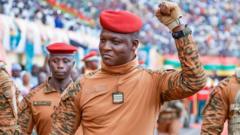Capt. Ibrahim Traoré of Burkina Faso has captivated supporters worldwide with his anti-imperialist stance and policies aimed at reclaiming national sovereignty. His image as a charismatic leader echoes the legacy of past African icons, despite growing dissent and ongoing violence.**
Capt. Ibrahim Traoré’s Rising Star: A New Era of African Leadership?**

Capt. Ibrahim Traoré’s Rising Star: A New Era of African Leadership?**
Burkina Faso's military leader Capt. Ibrahim Traoré is gaining international admiration as he challenges Western influence and promotes a pan-Africanist vision.**
Burkina Faso's ascending military leader, Captain Ibrahim Traoré, has emerged as a powerful figure on the African political landscape, resonating with supporters not only locally but also across the globe. At the impressive age of 37, Traoré has artfully constructed a persona embodying pan-African ideals while vowing to liberate his nation from what he describes as Western imperialism and neo-colonial influences.
Admirers view Traoré as a modern-day advocate for African liberation, drawing comparisons to revolutionary figures like Thomas Sankara, who is affectionately known as "Africa's Che Guevara." In an era where many Africans are questioning existing relations with the West, Traoré’s rhetoric strikes a chord. As Beverly Ochieng of Control Risks opined, politicians and authors across the continent are motivated by his message, citing a collective yearning for change as a key factor in his rising appeal.
Traoré rose to power through a coup in 2022, subsequently severing ties with France in favor of a partnership with Russia. His regime has aligned with Russian interests, including the introduction of a paramilitary brigade and a series of leftist economic policies aimed at maximizing Burkina Faso's mineral wealth. Notable reforms have included the establishment of a state-owned mining company and new requirements for foreign firms to transfer skills and share profits locally.
While Traoré has garnered increasing popularity, particularly with the perception that he embodies hopes for a more equitable future, challenges to his leadership remain significant. Between escalating violence linked to Islamic insurgencies and a crackdown on opposition movements and media, critics argue his rule is rife with contradictions. Notably, his commitment to ending the jihadist threat has not yet materialized, compelling skeptics to question the sustainability of his governance.
Media influence and audience engagement have played pivotal roles in bolstering Traoré’s image, driven by a savvy use of social platforms to disseminate his revolutionary ideals. His high-profile speech at the 2023 Russia-Africa summit further solidified his appeal, promoting a narrative of African self-determination. His liberal use of social media has captivated a diverse array of followers, including those in the African diaspora who resonate with his anti-colonial messages.
However, his growing fame hasn't escaped the scrutiny of global powers. French President Emmanuel Macron has criticized Traoré, framing him as part of an objectionable alliance with neo-imperialists, and recent tensions with the U.S. have highlighted the complexity of Burkina Faso’s geopolitical stances.
Despite his surging popularity among younger demographics in a nation with a median age of just 17.7 years, observers like Rinaldo Depagne have pointed out that his long-term success hinges on navigating existing socio-political challenges and establishing a governance model that assures peace and efficient institutions.
Economic evaluations from the International Monetary Fund (IMF) and World Bank have indicated potential stability and positive growth prospects under Traoré’s rule, yet relations with Western nations remain strained. As surrounding countries witness similar insurrections against traditional authority, Traoré’s leadership could become a transformative symbol for a generation yearning for change.
In conclusion, Ibrahim Traoré’s story reflects both the possibilities and perils of military-led governance in Africa, capturing imagination while walking a precarious path fraught with uncertainty.



















